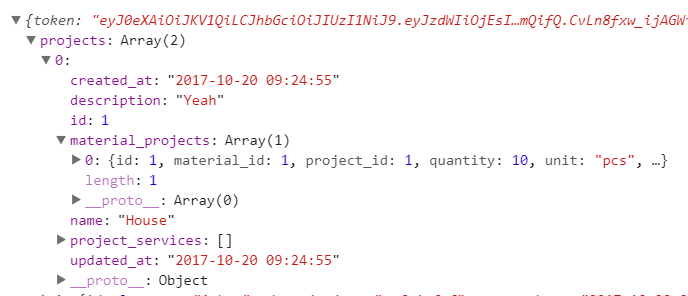Displaying Specific Data in Angular 2/4
I have an project api that either contains material_projects or project_services. I am confused on how would i display either one of them. If i display material_projects then i mustn't display project_services. project_services must be an empty in the api.
getAllProjects() {
this.subscription = this.projectsService.getAll()
.subscribe(
(data:any) => {
this.projects = data.projects;
console.log(data);
},
error => {
console.log(error);
});
}
html
<div class="card-block" *ngFor="let project of projects | search : searchBOM">
<h2 class="proj-name">{{ project.name | titlecase }} </h2>
<table class="table table-bordered table-striped">
<thead>
<tr>
<th>Material SKU</th>
<th>Material Name</th>
<th>Unit</th>
</tr>
</thead>
<tbody>
<tr *ngFor="let innerItem of project.material_projects">
<td>{{innerItem.material.sku}}</td>
<td>{{innerItem.material.name}}</td>
<td>{{innerItem.unit}}</td>
</tr>
</tbody>
</table>
</div>
If you can guarantee that constraint, then you may be able to simply iterate over both lists.
<tbody>
<tr *ngFor="let innerItem of project.material_projects">
<td>{{innerItem.material.sku}}</td>
<td>{{innerItem.material.name}}</td>
<td>{{innerItem.unit}}</td>
</tr>
<tr *ngFor="let innerItem of project.project_services">
<td>{{innerItem.service.sku}}</td>
<td>{{innerItem.service.name}}</td>
<td>{{innerItem.unit}}</td>
</tr>
</tbody>
As an alternative, you may conditionally display one or the other:
<tbody>
<ng-container *ngIf="project.material_projects.length > 0; then #materialProjectsRows; else #projectServicesRows"></ng-container>
<ng-template #materialProjectsRows>
<tr *ngFor="let innerItem of project.material_projects">
<td>{{innerItem.material.sku}}</td>
<td>{{innerItem.material.name}}</td>
<td>{{innerItem.unit}}</td>
</tr>
</ng-template>
<ng-template #projectServicesRows>
<tr *ngFor="let innerItem of project.projectServices">
<td>{{innerItem.service.sku}}</td>
<td>{{innerItem.service.name}}</td>
<td>{{innerItem.unit}}</td>
</tr>
</ng-template>
</tbody>
Or, if the DTOs are similar enough, you may consider sharing more of the view logic:
<tbody>
<!-- You may want to perform the concatenation inside of the view model for additional clarity -->
<tr *ngFor="let innerItem of project.material_projects.concat(project.project_services)">
<td>{{(innerItem.material || innerItem.service).sku}}</td>
<td>{{(innerItem.material || innerItem.service).name}}</td>
<td>{{innerItem.unit}}</td>
</tr>
</tbody>
EDIT:
If you would like to use different tables based on the existence of properties, then you will want to move your *ngIf statements up to the <table> element or an immediate child. Based on your comments, you might try something like the following:
<div class="card-block" *ngFor="let project of projects | search : searchBOM">
<ng-container *ngIf="getProjectType(project)">
<h2 class="proj-name">{{ project.name | titlecase }}</h2>
<table *ngIf="getProjectType(project) === 'material'" class="table table-bordered table-striped">
<thead>
<tr>
<th>Material SKU</th>
<th>Material Name</th>
<th>Unit</th>
</tr>
</thead>
<tbody>
<tr *ngFor="let innerItem of project.material_projects">
<td>{{innerItem.material.sku}}</td>
<td>{{innerItem.material.name}}</td>
<td>{{innerItem.unit}}</td>
</tr>
</tbody>
</table>
<table *ngIf="getProjectType(project) === 'services'" class="table table-bordered table-striped">
<thead>
<tr>
<th>Project SKU</th>
<th>Project Name</th>
<th>Unit</th>
</tr>
</thead>
<tbody>
<tr *ngFor="let innerItem of project.project_services">
<td>{{innerItem.project.sku}}</td>
<td>{{innerItem.project.name}}</td>
<td>{{innerItem.unit}}</td>
</tr>
</tbody>
</table>
</ng-container>
</div>
Component code:
export class ProjectComponent {
...
public getProjectType(project: Project): 'material' | 'services' | null {
return project.material_projects.length > 0 ? 'material'
: project.project_services.length > 0 ? 'services'
: null;
}
...
}
There are many ways to do this. Another option would be to use a switch statement in your template, or adding additional child ("dummy") components to handle the behavior.
- How to access a constant in an Angular 2 component and service?
- Image Not Loading in Angular 9
- Setup global providers for Angular unit tests
- zone.js cannot be resolved
- Hiding Angular API calls from developers tool network of browser
- Angular 19 Google Maps Javascript SDK Does not load properly
- How to disable ,hiding options from dopdown after selection
- Angular 19 ApplicationConfig use Configuration in factory
- Can't change an *ngFor to a @for. Its @for(commune of communes) is rejected, telling that Commune[] needs an iterator. But Commune is an interface
- How to add Google Analytics tracking with Angular Universal SSR
- Angular - Nothing is local storage after successful user login
- Recreate Ionic3 button with Ionic5
- Cannot inherit ionic global class
- How to use cordova-plugin-video-trim
- How to start the lifecycle of a component when using noop zone?
- Using Angular Signals with HostBinding to update style?
- How to get Dash.js instance as soon as it is initialized when using dash-video from media chrome
- Angular & PrimeNg Datepicker (p-calendar): Disable future dates
- Angular - Press enter on table column starts automatically button click
- How to remove default margin in angular app?
- TS2740: Type '{}' is missing the following properties from type 'ExpenseModel[]': length, pop, push, concat, and 26 more
- How to conditionally add animations in Angular 2
- Bootstrap modal backdrop show in front of the modal after recent chrome update
- How do I view JSCode-generated documentation in Visual Studio Code?
- Add property to object only if it is not undefined
- Injecting parent component with base class type in angular
- Angular Material 18: 'Hue "500" does not exist in palette'
- toSignal() cannot be called from within a reactive context
- Nodejs Express api cors error on calling api using angular frontend
- ASP.NET Core Development Certificates - error exporting the HTTPS developer certificate
